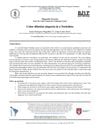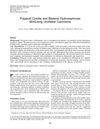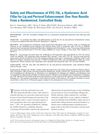 21 citations,
February 2009 in “Journal of the American Academy of Dermatology”
21 citations,
February 2009 in “Journal of the American Academy of Dermatology” Some cases of tinea capitis, a fungal scalp infection, can look like scarring hair loss due to the body's immune response and the fungus itself.

The document recommends a multidisciplinary approach and experience sharing to advance facial feminization surgery as a medical field.
2 citations,
June 2016 in “Oral Surgery Oral Medicine Oral Pathology and Oral Radiology” Oral lichen planus can appear before lichen planopilaris.
 February 2023 in “JAAD case reports”
February 2023 in “JAAD case reports” Reducing immunosuppression and using antiviral creams improved the woman's skin condition.
 November 2022 in “Brazilian journal of veterinary pathology”
November 2022 in “Brazilian journal of veterinary pathology” The Yorkshire terrier has a genetic hair loss condition not improved by treatment.
 10 citations,
January 2017 in “Skin Pharmacology and Physiology”
10 citations,
January 2017 in “Skin Pharmacology and Physiology” Finasteride may cause vitiligo, sexual issues, and depression; better treatments and predicting side effects needed.
37 citations,
February 2010 in “Psychoneuroendocrinology” Androgen self-administration might be controlled by membrane receptors, not nuclear ones.
 4 citations,
August 2021 in “Clinical and Experimental Reproductive Medicine”
4 citations,
August 2021 in “Clinical and Experimental Reproductive Medicine” The 2018 guideline for PCOS suggests new diagnostic criteria and treatments, but recognizes the need for more research.
Oral contraceptives and antiandrogens are the best treatments for hirsutism.
 20 citations,
January 2017 in “Actas Dermo-Sifiliográficas”
20 citations,
January 2017 in “Actas Dermo-Sifiliográficas” Recent advances in hair loss treatments show significant progress.
September 2021 in “Faculty Opinions – Post-Publication Peer Review of the Biomedical Literature”  27 citations,
January 2012 in “Current Topics in Microbiology and Immunology”
27 citations,
January 2012 in “Current Topics in Microbiology and Immunology” Mice that can regenerate tissue have cells that pause in the cell cycle, which is important for healing, similar to axolotls.

Calorie restriction changes the elemental and isotopic makeup of mouse hair and bone.
 3 citations,
February 2019 in “Journal of endourology case reports”
3 citations,
February 2019 in “Journal of endourology case reports” Polypoid cystitis can mimic bladder cancer but can be effectively treated with surgery, stents, and medication.
 78 citations,
April 1984 in “Archives of Dermatology”
78 citations,
April 1984 in “Archives of Dermatology” Minoxidil can help regrow hair in alopecia areata patients.
January 2023 in “Frontiers in Medicine” ALRV5XR is the most effective hair regrowth treatment at 24 weeks.
 November 2023 in “Aktualʹnì problemi sučasnoï medicini”
November 2023 in “Aktualʹnì problemi sučasnoï medicini” The guidelines suggest using various treatments, including antidepressants and steroids, for alopecia areata and discuss the condition's genetic and immune aspects.
 September 2023 in “Journal of the American Academy of Dermatology”
September 2023 in “Journal of the American Academy of Dermatology” Having PCOS does not make hidradenitis suppurativa worse.
 August 2023 in “Journal of The American Academy of Dermatology”
August 2023 in “Journal of The American Academy of Dermatology” Finasteride made hair thicker on the back of the head in men with hair loss.
8 citations,
March 2001 in “PubMed” A man developed recurring scalp inflammation and hair loss after a head injury.
 6 citations,
September 2016 in “Journal of Mind and Medical Sciences”
6 citations,
September 2016 in “Journal of Mind and Medical Sciences” Finasteride can cause side effects, some lasting after treatment ends, and may lead to severe depression or suicidal thoughts.
 6 citations,
August 2023 in “European journal of endocrinology”
6 citations,
August 2023 in “European journal of endocrinology” The 2023 guideline advises a detailed approach for PCOS, focusing on early detection, lifestyle and medical treatments, and managing health risks.
 22 citations,
September 2015 in “Fertility and Sterility”
22 citations,
September 2015 in “Fertility and Sterility” The oral glucose tolerance test is effective in detecting abnormal glucose tolerance in Indian women with PCOS.
 4 citations,
June 2021 in “Powder Technology”
4 citations,
June 2021 in “Powder Technology” Granules improve hair loss treatment by targeting follicles.
 42 citations,
February 2017 in “Dermatologic surgery”
42 citations,
February 2017 in “Dermatologic surgery” VYC-15L is a safe and effective lip filler that lasts up to a year.
 13 citations,
September 2011 in “American Journal of Clinical Dermatology”
13 citations,
September 2011 in “American Journal of Clinical Dermatology” The oral contraceptive ethinylestradiol/chlormadinone acetate is effective in reducing acne and improving other skin conditions related to high androgen levels.
 1 citations,
October 2010 in “Cambridge University Press eBooks”
1 citations,
October 2010 in “Cambridge University Press eBooks” Hormonal therapies are effective for managing hair and skin symptoms in women with PCOS.
 14 citations,
September 2019 in “Eye”
14 citations,
September 2019 in “Eye” Some oral medications may help treat central serous chorioretinopathy, especially eplerenone, but more research is needed.
May 2018 in “Hair transplant forum international” Topical finasteride promotes hair growth with minimal side effects but needs more research for women and optimal use.
 March 2021 in “Uludağ Üniversitesi Tıp Fakültesi dergisi”
March 2021 in “Uludağ Üniversitesi Tıp Fakültesi dergisi” The review provided information on various treatments to stop hair thinning and increase hair density in people with common genetic hair loss.






















